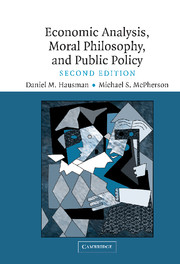Book contents
- Frontmatter
- Contents
- Preface
- INTRODUCTION
- I RATIONALITY AND MORALITY
- II WELFARE AND CONSEQUENCES
- III LIBERTY, RIGHTS, EQUALITY, AND JUSTICE
- 10 Liberty, Rights, and Libertarianism
- 11 Equality and Egalitarianism
- 12 Justice and Contractualism
- IV MORAL MATHEMATICS
- CONCLUSIONS
- Appendix: How Could Ethics Matter to Economics?
- Glossary
- References
- Index
12 - Justice and Contractualism
Published online by Cambridge University Press: 06 July 2010
- Frontmatter
- Contents
- Preface
- INTRODUCTION
- I RATIONALITY AND MORALITY
- II WELFARE AND CONSEQUENCES
- III LIBERTY, RIGHTS, EQUALITY, AND JUSTICE
- 10 Liberty, Rights, and Libertarianism
- 11 Equality and Egalitarianism
- 12 Justice and Contractualism
- IV MORAL MATHEMATICS
- CONCLUSIONS
- Appendix: How Could Ethics Matter to Economics?
- Glossary
- References
- Index
Summary
The questions of justice that are important to economists concern the distribution of benefits and burdens among members of a community. What claims can persons legitimately make upon one another or upon the state? What burdens can the state place on its citizens, or can individuals place on one another? Because justice is concerned with the proper distribution of scarce resources in society, its subject matter overlaps with economics.
Economists cannot decide what principles of justice to rely on merely by consulting public opinion, because people are committed to many principles of justice, which are at differing levels of generality and are often ambiguous and conflicting. Even when there is a social consensus on a principle of justice, it may not be well considered, and economists may still not find much guidance. Consider, for example, equality of opportunity. Everybody is for it, but that's partly because there's so little agreement about what it is. Does equality of opportunity require that more resources be devoted to the education of the relatively disadvantaged? Does equality of opportunity require steeper inheritance taxes? Does equality of opportunity rule out affirmative action or require it? Questions about the extent to which economic policies contribute to equality of opportunity can scarcely be broached until the concept itself is clarified. Economic evaluation presupposes well-defined principles of justice.
- Type
- Chapter
- Information
- Economic Analysis, Moral Philosophy and Public Policy , pp. 198 - 214Publisher: Cambridge University PressPrint publication year: 2006



